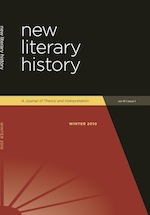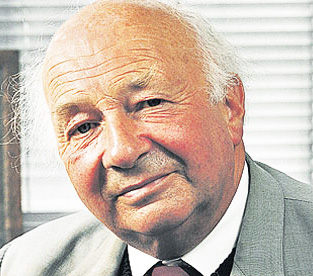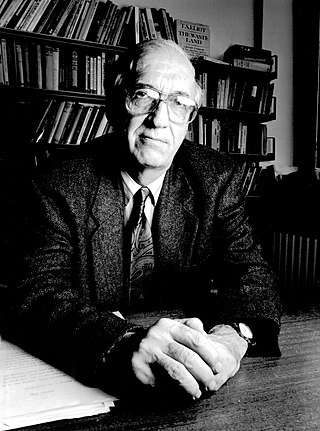
Literary theory is the systematic study of the nature of literature and of the methods for literary analysis. Since the 19th century, literary scholarship includes literary theory and considerations of intellectual history, moral philosophy, social philosophy, and interdisciplinary themes relevant to how people interpret meaning. In the humanities in modern academia, the latter style of literary scholarship is an offshoot of post-structuralism. Consequently, the word theory became an umbrella term for scholarly approaches to reading texts, some of which are informed by strands of semiotics, cultural studies, philosophy of language, and continental philosophy.

Frank Raymond "F. R." Leavis was an English literary critic of the early-to-mid-twentieth century. He taught for much of his career at Downing College, Cambridge, and later at the University of York.
Jonathan Culler is an American literary critic. He was Class of 1916 Professor of English and Comparative Literature at Cornell University. His published works are in the fields of structuralism, literary theory and literary criticism.
Sir Christopher Bruce Ricks is a British literary critic and scholar. He is the William M. and Sara B. Warren Professor of the Humanities at Boston University (US), co-director of the Editorial Institute at Boston University, and was Professor of Poetry at the University of Oxford (UK) from 2004 to 2009. In 2008, he served as president of the Association of Literary Scholars and Critics. He is known as a champion of Victorian poetry; an enthusiast of Bob Dylan, whose lyrics he has analysed at book length; a trenchant reviewer of writers he considers pretentious ; and a warm reviewer of those he thinks humane or humorous. Hugh Kenner praised his "intent eloquence", and Geoffrey Hill his "unrivalled critical intelligence". W. H. Auden described Ricks as "exactly the kind of critic every poet dreams of finding". John Carey calls him the "greatest living critic".
Anthony Edward Dyson, aka Tony Dyson was a British literary critic, university lecturer, educational activist and gay rights campaigner.
Frederick (Noel) Wilse Bateson was an English literary scholar and critic.

New Literary History: A Journal of Theory & Interpretation is a quarterly academic journal published by Johns Hopkins University Press. It focuses on the history and theory of literature, and key questions of interpretation. The journal has received six awards from the Council of Editors of Learned Journals.
Richard Boris Ford, was a literary critic, writer, editor and educationist.

Colin Myles Joseph MacCabe is an English academic, writer and film producer. He is currently a distinguished professor of English and film at the University of Pittsburgh.
Richard Poirier was an American literary critic.
Canadian Literature is a quarterly peer-reviewed journal of criticism and review, founded in 1959 and owned by the University of British Columbia. The journal publishes articles of criticism and reviews about Canadian literature in English and French by Canadian and international scholars. It also publishes around 24 original poems a year and occasional interviews with writers. Each issue contains an extensive book reviews section. Rather than focusing on a single theoretical approach, Canadian Literature contains articles on all subjects relating to writers and writing in Canada. Each issue contains content from a range of contributors, and the journal has been described as "critically eclectic".
Louis Dean Owens was a novelist and scholar who claimed Choctaw, Cherokee, and Irish-American descent. He is known for a series of Native-themed mystery novels and for his contributions to the then-fledgling field of Native American Studies. He was also a professor of English and Native American studies, and frequently contributed articles, literary criticism and reviews to periodicals. Owens committed suicide in 2002.
Derek Attridge FBA is a South African-born British academic in the field of English literature and a current Professor of English at the University of York, a post he has held since 2003. Attridge undertakes research in South African literature, James Joyce, deconstruction and literary theory and the performance of poetry. He wrote a monograph on South African writer J. M. Coetzee.
Robert Anthony Welch was an Irish author and scholar.
Scrutiny: A Quarterly Review was a literature periodical founded in 1932 by L. C. Knights and F. R. Leavis, who remained its principal editor until the final issue in 1953. Other editors included D. W. Harding and Harold Andrew Mason.

John Barry Steane was an English music critic, musicologist, literary scholar and teacher, with a particular interest in singing and the human voice. His 36-year career as a schoolmaster overlapped with his career as a music critic and author of books on Elizabethan drama, and opera and concert singers.

That part of the United Kingdom called Northern Ireland was created in 1922, with the partition of the island of Ireland. The majority of the population of Northern Ireland wanted to remain within the United Kingdom. Most of these were the Protestant descendants of colonists from Great Britain.
Austin Harvey Gommeknown asAndor Gomme was a British scholar of English literature and architectural history. He was a frequent reviewer for the Times Literary Supplement, an author of books on both literary criticism and architectural history, and Chair of the Society of Architectural Historians of Great Britain, whose journal, Architectural History, he edited for many years.

The Year's Work in Modern Language Studies (YWMLS) is a peer reviewed English-language evaluative bibliographical journal which appears annually, containing reports on new scholarship in the fields of European languages, linguistics, literature and film, except for English studies. The MLA Literary Research Guide says: "YWMLS is the single most comprehensive evaluative survey of scholarship on European and Latin American languages and literatures. Taken together, the annual volumes offer an incomparable record of scholarly and critical trends as well as of the fluctuations of academic reputations of literary works and authors."

Charles Brian Cox CBE was an English academic and poet.







